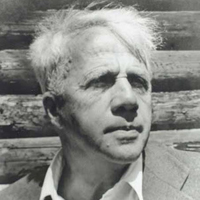The Wood Pile by Robert Frost: Summary and Analysis
The Wood Pile appeared in 'North of Boston'. It is written in blank verse. In it the poet keeps close to his experience and states what he actually observes. The poet takes a walk in the frozen swamp one day. During the walk he comes across two things: a small bird, and the woodpile. The entire poem centers on these two objects of observation.

Robert Frost (1874-1963)
The poem begins with the personal walk, then the bird, and ends with the description of the woodpile.
The poet's path was through the snow, so he could not move fast. But the traveler before him had made his movement easy here and there. The view of the place was all alike, and so nothing could be marked or named individually. The bird was all foolish for all its thinking, since it thought that the poet was after it for its white feather in the tail. The poet's eyes caught the woodpile, which made him forgetful of the small bird, and let it out of his way even without wishing goodnight to it.
The wood pile looked to have gone lower than when it was made in the beginning. It is conspicuous in hedges by its plentiful clusters of white blossoms. The idea struck the poet's mind that the woodpile was made by somebody who kept on changing his jobs. Only such a man alone could have forgotten the product of his own hand. But the woodpile is only getting rotten in the frozen swamp, as it could do. It is decaying there slowly and without smoke. 'To warm' and 'smokeless burning' have been used in an ironical sense. Seeing a woodpile, propped on one side by a tree and on the other by a "stake and prop-about to fall", the observer who is the poet himself wonders as to why the woodpile was left there, so far away from any fireplace, where alone it could have been of some use.
The subject-matter of the poem is the woodpile that the poet saw while out for a walk one day. It generated thought and feeling in him. As a poet describes it, the weather-beaten woodpile becomes a cosmic symbol of the cycle of labor and decay. The man who piled the wood was willing to forget all about the product of his own labor, because he believed in a different philosophy of life-ever "turning to fresh tasks." He left the fruit of his labor to get ruined and rotten in the forest.
The Wood Pile is a poem which has been praised for its quality of "fidelity to fact.” It is a poem keeping absolutely to the facts of experience. It is in the form of a pure description as to what happened to the poet on his loitering. The poem has a hesitant start:’ I will turn back from here. No, I will go on farther-and we shall see.' The speaker also changes his tone here- he leaves the use of singular for the plural. Thus, "I will go on" becomes "we shall see" to take the reader into confidence. The poem is the factual record of the poet's observation and experience.
Related Topics
The Silken Tent: Summary and Analysis
The Death of the Hired Man: Summary and Analysis
Neither Out Far nor In Deep: Summary and Analysis
West Running Brook: Summary and Analysis
Stopping by Woods on a Snowy Evening: Analysis
A Considerable Speck: Literary Analysis
A Considerable Speck: Critical Analysis
Mending Wall: Summary and Analysis
Home Burial: Summary and Analysis
After Apple Picking: Summary and Analysis
The Road Not Taken: Summary and Analysis
Fire and Ice: Summary and Analysis
Nothing Gold Can Stay: Summary and Analysis
Acquainted with the Night: Summary and Analysis
The Gift Outright: Summary and Analysis
 |
bachelorandmaster.com |